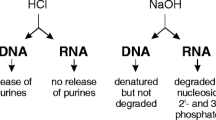Abstract
Currently, there are several protocols to extract bacterial DNA based on different principles. However, the quantity and the quality of the DNA obtained by each method are highly variable and microorganism dependent. In most of these classical crude methods, highly toxic and hazardous organic solvents such as phenol and chloroform are used for deproteinization, whereas in certain protocols, expensive enzymes including RNases and Proteinases are used. This study was designed to introduce a simple, rapid, inexpensive and effective genomic DNA isolation procedure for Gram-negative bacteria, without the usage of toxic chemicals and costly enzymes. This novel method was compared with another classical method known as the salting-out method, which uses proteinase-K. Concentration and yield of the extracted DNA were determined by gel electrophoresis by comparing the gel band intensity of the sample DNA to that of a DNA quantitation standard and by the Quantus™ fluorometer. According to the results, the yield of extracted DNA was higher in the novel method compared to the salting-out method. Moreover, the entire process was accomplished in less than 2 h with the novel method. Purity and integrity of extracted genomic DNA by both methods were similar. In addition, the quality of DNA was determined using Multicopy Associated Filamentation (MAF) gene amplification by polymerase chain reaction (PCR). Thus, the described technique is non-toxic, less time and fund consuming, efficient and a well-suited method for routine DNA isolation from Gram negative bacteria.




Similar content being viewed by others
References
Alexopoulou K, Foka A et al (2006) Comparison of two commercial methods with PCR restriction fragment length polymorphism of the tuf gene in the identification of coagulase-negative Staphylococci. Lett Appl Microbiol 43(4):450–454. https://doi.org/10.1111/j.1472-765X.2006.01964.x
Beveridge TJ (1981) Ultrastructure, chemistry, and function of the bacterial wall. Int Rev Cytol 72:229–317. https://doi.org/10.1016/s0074-7696(08)61198-5
Chassy BM, Giuffrida A (1980) Method for the lysis of gram-positive, asporogenous bacteria with lysozyme. Appl Environ Microbiol 39(1):153–158. https://doi.org/10.1128/aem.39.1.153-158.1980
Chen W, Kuo TT (1993) A simple and rapid method for the preparation of gram-negative bacterial genomic DNA. Nucleic Acids Res 21(9):2260. https://doi.org/10.1093/nar/21.9.2260
Chen H, Rangasamy M, Tan SY, Wang H, Siegfried BD (2010) Evaluation of five methods for total DNA extraction from western corn rootworm beetles. PLoS ONE 5(8):e11963. https://doi.org/10.1371/journal.pone.0011963
Farook RSM, Mathew D, Witharana c (2022) A novel thermostable α-amylase producing caldimonas variant from a hot water spring in Sri Lanka. Int Aca J App Biomed Sci 3(5):11–22
Graham LL, Beveridge TJ, Nanninga N (1991) Periplasmic space and the concept of the periplasm. Trends Biochem Sci 16(9):328–329. https://doi.org/10.1016/0968-0004(91)90135-I
Hegen PN (1994) Recovering DNA from agarose gels. Trends Biochem Sci 19(9):388–389. https://doi.org/10.1016/0968-0004(94)90117-1
Hobot JA, Carlemalm E et al (1984) Periplasmic gel: New concept resulting from the reinvestigation of bacterial cell envelope ultrastructure by new methods. J Bacteriol 160(1):143–152. https://doi.org/10.1128/jb.160.1.143-152.1984
Hwang C, Ling F et al (2012) Evaluation of methods for the extraction of DNA from drinking water distribution system biofilms. Microbes Environ 27(1):9–18. https://doi.org/10.1264/jsme2.me11132
Intorasoot S, Srirung R et al (2009) Application of gelatin-coated magnetic particles for isolation of genomic DNA from bacterial cells. Anal Biochem 386(2):291–292. https://doi.org/10.1016/j.ab.2008.12.032
Kabir S, Shahriar M et al (2006) High salt SDS-based method for the direct extraction of genomic DNA from three different Gram-negative organisms. CDR 1(2):57–64
Klaenhammer TR (1984) A general method for plasmid isolation in Lactobacilli. Curr Microbiol 10:23–28. https://doi.org/10.1007/BF01576043
Marmur J (1961) A procedure for the isolation of deoxyribonucleic acid from micro-organisms. J Mol Biol 3(2):208–218. https://doi.org/10.1016/S0022-2836(61)80047-8
Matias RF, Al Amoudi A et al (2003) Cryo-transmission electron microscopy of frozen-hydrated sections of Escherichia coli and Pseudomonas aeruginosa. J Bacteriol 185(20):6112–6118. https://doi.org/10.1128/JB.185.20.6112
Miller SA, Dykes DD, Polesky HF (1988) A simple salting out procedure for extracting DNA from human nucleated cells. Nucleic Acids Res 16(3):1215. https://doi.org/10.1093/nar/16.3.1215
Nanninga N (1998) Morphogenesis of Escherichia coli. Microbiol Mol Biol Rev 62(1):110–125. https://doi.org/10.1128/mmbr.62.1.110-129.1998
Shao W, Khin S, Kopp WC (2012) Characterization of effect of repeated freeze and thaw cycles on stability of genomic DNA using pulsed field gel electrophoresis. Biopreserv Biobank 10(1):4–11. https://doi.org/10.1089/bio.2011.0016
Wintzingerode F, Go UB, Stackebrandt E (1997) Determination of microbial diversity in environmental samples: pitfalls of PCR-based rRNA analysis. FEMS Microbiol Rev 21(3):213–229. https://doi.org/10.1111/j.1574-6976.1997.tb00351.x21
Yao X, Jericho M, Pink D (1999) Thickness and elasticity of gram-negative murein sacculi measured by atomic force microscopy. J Bacteriol 181(22):6865–6875. https://doi.org/10.1128/JB.181.22.6865-6875.1999
Acknowledgements
Authors would like to acknowledge the academic and nonacademic staff of Department of Biochemistry and Molecular Biology of Faculty of Medicine, University of Colombo, Sri Lanka.
Funding
The authors did not receive financial support from any organization for the submitted work.
Author information
Authors and Affiliations
Contributions
LRW—conception and design, conducting the research, specifically performing the experiment, methodology, data analysis and interpretation, drafting the original article, material preparation. CW—supervision, conceptualization, review and the final approval of the draft to be submitted. All authors read and approved the final manuscript.
Corresponding author
Ethics declarations
Conflict of interest
The authors declare that they have no conflict of interest.
Additional information
Communicated by Martine Collart.
Publisher's Note
Springer Nature remains neutral with regard to jurisdictional claims in published maps and institutional affiliations.
Rights and permissions
Springer Nature or its licensor (e.g. a society or other partner) holds exclusive rights to this article under a publishing agreement with the author(s) or other rightsholder(s); author self-archiving of the accepted manuscript version of this article is solely governed by the terms of such publishing agreement and applicable law.
About this article
Cite this article
Weerakkody, L.R., Witharana, C. A rapid, inexpensive and effective method for the efficient isolation of genomic DNA from Gram-negative bacteria. Mol Genet Genomics 299, 26 (2024). https://doi.org/10.1007/s00438-024-02120-x
Received:
Accepted:
Published:
DOI: https://doi.org/10.1007/s00438-024-02120-x




